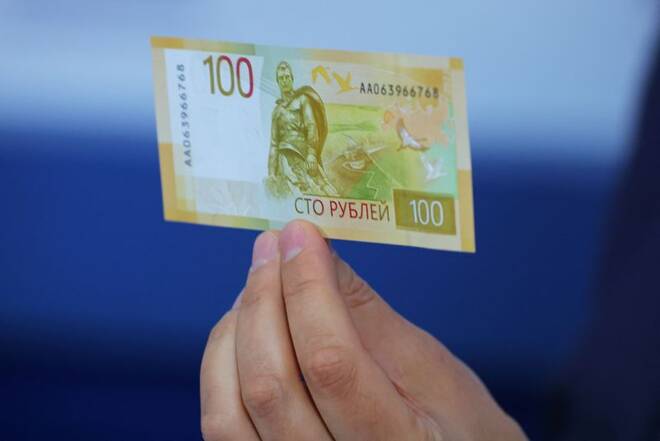Advertisement
Advertisement
Volatile rouble gains, Russian stocks steady as oil prices hit low
By:
MOSCOW (Reuters) - The Russian rouble strengthened on Wednesday to a one-week high against the euro, boosted by upcoming tax payments that usually boost demand for the Russian currency, while stock indexes climbed higher.
By Alexander Marrow
MOSCOW (Reuters) -The rouble soared to a one-week high against the euro on Wednesday as Russia’s currency and stocks swung in volatile trade, hurt by oil prices touching a six-month low but helped by the prospect of upcoming tax payments that usually boost demand.
By 1107 GMT, the rouble had gained 1.5% to trade at 61.17 versus the euro, a one-week high. It was 0.9% stronger against the dollar at 60.34.
The rouble is the world’s best-performing currency this year on the back of capital controls and is expected to find more support soon from month-end tax payments that usually prompt export-focused companies to convert part of their foreign currency revenue.
The rouble is likely to trade in a range of 60 to 62 against the dollar until exporters become more active in terms of tax payments, Promsvyazbank analysts wrote in a note.
Rouble volatility has declined recently after wild swings carried it to a record low of 121.53 against the dollar on the Moscow Exchange in March, days after Russia sent tens of thousands of troops into Ukraine on Feb. 24, before rallying in June to a seven-year peak of 50.01.
Economy ministry forecasts seen by Reuters suggest Russia’s economy is dealing with sanctions better than initially feared and will contract less than expected.
Exchange trading
Trading curbs on Russian markets are gradually easing. The Moscow Exchange has permitted investors from “friendly” jurisdictions, or those which have not imposed sanctions on Russia, to start trading on the derivatives market after an almost six-month hiatus.
That ruling does not apply to the main stock market, but since Monday, the exchange has allowed non-residents from “friendly” countries to trade bonds.
“A positive factor now is the fact that, with the return of non-resident investors to the debt market, there was no selling overhang,” said Alfa Capital.
Brent crude oil, a global benchmark for Russia’s main export, hit a six-month low on Wednesday, spurring volatility in Russian stocks.
The dollar-denominated RTS index was up 0.9% to 1,1466.8 points, after earlier hitting its strongest mark since late July. The rouble-based MOEX Russian index was 0.1% lower at 2,205.7 points, slipping away from a more than five-week high of 2,225.05 points hit in early trade.
Traders and fund managers have left crude oil markets in recent months, dropping activity to a seven-year low amid the worst global energy crisis in decades as investors become unwilling to deal with persistently high volatility.
(Reporting by Alexander Marrow; Editing by Clarence Fernandez, Mark Potter and Krishna Chandra Eluri)
About the Author
Reuterscontributor
Reuters, the news and media division of Thomson Reuters, is the world’s largest international multimedia news provider reaching more than one billion people every day. Reuters provides trusted business, financial, national, and international news to professionals via Thomson Reuters desktops, the world's media organizations, and directly to consumers at Reuters.com and via Reuters TV. Learn more about Thomson Reuters products:
Advertisement
